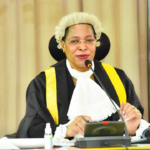The Uganda Law Society (ULS) has recalled its unelected representatives from the Judicial Service Commission (JSC).
According to Isaac Ssemakadde (pictured above), President of ULS, the decision is aimed at restoring trust in judicial appointments, ensuring representation that aligns with democratic principles, and addressing public concerns about judicial integrity.
The unelected representatives include Ruth Sebatindira and Norah Matovu Winyi, who have held their roles on the JSC since 2016 without undergoing the election process mandated by ULS regulations.
The recall directive follows a judgement by the High Court in which it challenged the ULS’s appointment practices for its representatives to the JSC and other statutory bodies.
The court found that ULS appointments to these critical roles lacked an electoral mandate, breaching both the 1956 Uganda Law Society Act and the Uganda Law Society (Elections) Regulations of 2016.
This ruling highlighted a critical oversight within the ULS, calling into question the legitimacy of several long-standing appointments and pushing the organisation to confront internal governance issues.
The High Court ruling emphasised that these appointments, made without elections, went against ULS’s democratic requirements, potentially undermining public confidence in the judiciary due to a perceived lack of transparency.
“For our judiciary to serve Ugandans with fairness and integrity, it is paramount that its overseers reflect the collective will of our legal professionals. This recall shows our resolve to hold ourselves to the highest standards of transparency and accountability.” Ssemakadde said
“This recall order is just one part of the ULS’s broader strategy to enhance judicial accountability. Alongside this recall, the ULS has committed to additional reforms within Uganda’s judicial system, with plans to address issues such as merit-based recruitment, public participation in judicial appointments, and thorough vetting processes,” he said.
He said the move has resonated with both legal professionals and the Ugandan public, who have voiced longstanding concerns over judicial transparency and impartiality.
He argued that by returning the power of selection to its membership, the ULS is attempting to re-establish public confidence in the judiciary at a time when trust has eroded due to a perceived lack of transparency in judicial appointments.
The judiciary’s independence and integrity, observers note, are vital to Uganda’s democratic fabric, and the ULS’s actions represent a push toward a more credible and representative judicial oversight body.








